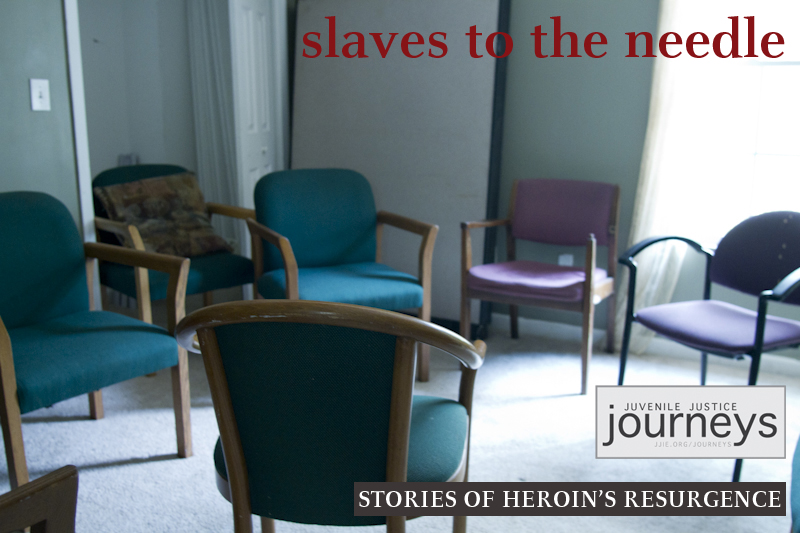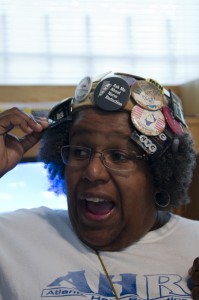
Mona Bennett. Photo by Clay Duda
["Making Peace with the Dragon on One Atlanta Streetcorner" is the final part of a three part series on heroin addiction. Check out this page for parts one and two.]
Mona Bennett never leaves the house without her Braves baseball hat. The cap itself is hidden beneath dozens of buttons of all shapes and sizes pinned to every available surface with messages from “Rock the Vote” to “This place really cooks!” But Bennett is most proud of a series of buttons from the Atlanta Harm Reduction Center (AHRC) where Bennett is the program director. The buttons and the hat always draw curious stares and questions. And Bennett is always happy to answer.
Harm reduction is a public health strategy — a way of thinking, Bennett calls it — that helps people protect themselves from the dangers of illegal drug use, unprotected sex and prostitution. “It’s about making sure people know the risks of using drugs and how to reduce those risks,” Bennett said.
At AHRC, reducing risk takes a variety of forms, among them a hypodermic needle exchange, HIV and tuberculosis testing and condom distribution (Bennett's hat is pinned with condoms, as well).
The Atlanta Harm Reduction Center is located in an area of southwest Atlanta known as the Bluffs, one of the city’s most poverty- and crime-ridden neighborhoods. From the street, AHRC looks like a well-maintained residential, two-story duplex in a neighborhood filled with small homes and cracked, weed choked sidewalks. A paved driveway gives way to a dirt parking lot filled with a few cars and a large, white passenger van, all parked at odd angles without thought to creating orderly rows. Inside, AHRC is a mish-mash of donated and second-hand office furniture. The walls are covered with colorful posters and artwork promoting safe sex or HIV testing. One wall is painted with the message, “Safety counts! Wrap it before you tap it.” Educational pamphlets are everywhere — hanging in bins on the wall, lining every flat surface and in the hands of volunteers.
Just inside the main office door is a kitchen where volunteers prepare meals for everyone who attends group sessions at the house. Beyond that is a room filled with desktop computers that are available to anyone who needs Internet access. Another has telephones. At the far end of the house is a living room lined with soft sofas.
“Those towels behind you: we offer showers,” Bennett said as she showed us around the house.
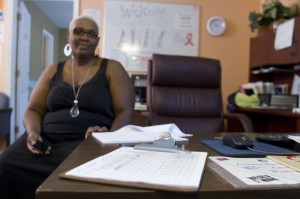
An AHRC volunteer sitting in front of the sign-in clipboard. Photo by Clay Duda
Volunteers are at every turn signing visitors in, talking with them, giving them cold, bottled water or donuts and pastries. Moving on through the house, past the woman wearing a Run-DMC t-shirt and beyond an oversized, orange cooler, are stairs leading to the second floor.
“Monday was HIV testing day,” Bennett said, reaching the top of the stairs. “Sixty-seven people now know their HIV status.”
Upstairs, AHRC holds group sessions or watches movies. Visitors can also “shop” from a room packed with donated clothing.
“At least half of the people we deal with are homeless,” Bennett said. “People have a lot of needs.”
All of these services fall under the harm reduction label, but AHRC is most known for being the only hypodermic needle exchange in Georgia. Two days a week, the AHRC team conducts “street outreach.” They load the oversized, white van parked out front with new, clean needles and drive a few blocks away where they set up shop on a corner and meet with intravenous drug users. There, the staff hand out clean needles, accept used, dirty needles for proper disposal and provide information on safer intravenous drug use. In its 17-year existence, AHRC has conducted more than 750,000 needle exchanges.
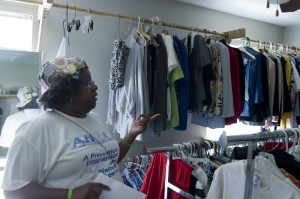
Bennett gives a tour of AHRC's donated clothing closet. Photo by Clay Duda
Proponents of harm reduction assert needle exchanges save lives. According to a United Nation report, one in 10 new cases of HIV worldwide are the result of intravenous drug use. Clean needles significantly reduce an intravenous drug user’s risk of contracting HIV or Hepatitis C. In Australia for example, where the government invested $243 million in needle exchange programs between 2000 and 2009, it is estimated that more than 32,000 HIV cases and more than 96,000 Hepatitis C cases were averted through the distribution of clean needles.
Not everyone thinks the benefits of needle exchanges outweigh the costs, however. Calvina L. Fay, executive director of the Drug Free America Foundation worries that giving drug users more needles leads to dangers for everyone else.
“We’ve had reports from cities,” Fay said, “where they’ve found large quantities of needles that have been improperly discarded on the streets, on the ground, which of course puts children at risk.”
Fay also worries that needle exchanges are focusing on the wrong issues and “aiding and abetting” the drug users’ addictions.
“They are giving out large quantities of needles but they are not being proactive in getting that person to engage in a treatment process that would move them to abstinence,” she said. “It’s not the compassionate thing. The compassionate thing would be to spend that money on more treatment beds and help people get drug-free.”
But Bennett said drug users wouldn’t seek out treatment until they’re ready. Telling them to stop using doesn’t work, she said. In the meantime, AHRC — and needle exchanges nationwide — are helping the user to remain as healthy as possible until they are ready for treatment.
“The person that is using sets their own goals,” Bennett said. “When they are ready we get them treatment. We are enabling people to live a healthier, wiser life,” Bennett said.
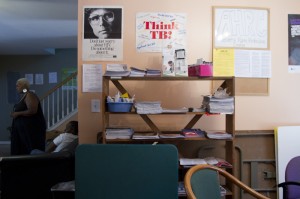
Brochures and educational pamphlets and posters in the AHRC office. Photo by Clay Duda
AHRC faces a number of barriers to fulfilling its mission, however. The law, for instance, isn’t necessarily on AHRC’s side. In Georgia, distributing hypodermic needles is illegal. But with a creative reading of the code and the help of authorities looking the other way, AHRC has survived for 17 years.
According to Bennett, the law allows handing out needles for a “legitimate medical purpose,” an affirmative defense should questions of legality ever be raised. Police have occasionally stopped by the street outreach asking questions, but no one has ever been arrested or cited, Bennett said.
AHRC is also only one small organization in a big city and an even bigger state, both fighting the ravaging effects of heroin abuse. Despite being the only needle exchange in Georgia, its budget and its effective reach is small. AHRC is a neighborhood center. Bennett said they hope to expand in the future if they can obtain more funding. Until then, intravenous drug users in Georgia or Atlanta looking for a safer high have to make their way to the Bluffs to visit AHRC.
